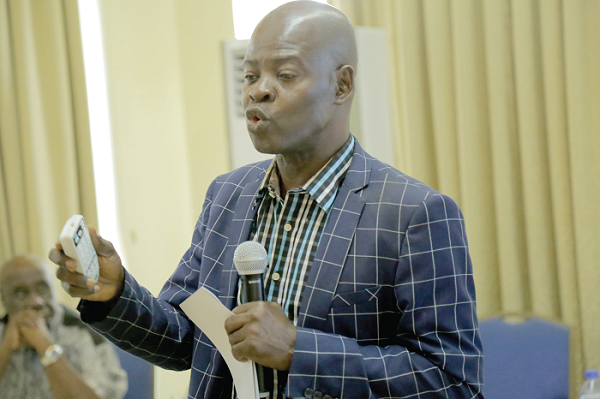
Dr Steve Manteaw urges cautious optimism over ExxonMobil deal
An energy sector policy analyst, Dr Steve Manteaw, has urged Ghanaians to be cautiously optimistic about the recently signed oil contract between Exxon Mobil Corporation (ExxonMobil) and the government.
He said although the terms of the deal had been described as one of the best for the country since the start of its oil production, some fundamental issues with the process had the tendency to override the gains.
At a session to review the 2017 semi-annual report of the Public Interest and Accountability Committee (PIAC) for members of the Institute of Financial and Economic Journalists (IFEJ) in Koforidua, Dr Manteaw highlighted four main issues arising from the deal stressing that, “we should not be excited about it in spite of all the good reasons that have been raised with having a company as big as ExxonMobil coming to Ghana.”
Dr Manteaw, who is also the co-chair of the Ghana Extractive Industries Transparency Initiative (GHEITI), said the default position of the law in respect of licensing was not followed in the deal.
The Petroleum Exploration and Production Law (2016), Act 919 moved the country away from direct negotiation to open competitive bidding as the default process for allocating petroleum rights but with this particular deal, the government resorted to using a direct negotiation.
Secondly, he said the notice of negotiation did not provide convincing basis for the direct negotiation.
“They made an attempt to justify that in accordance with provisions in the Act on why they wanted to do direct negotiations, but they were not convincing enough,” he said.
He said Act 919 was passed in August 2016 and the notice of Direct Negotiation was placed in the newspapers in October 2017. Again, the notice made reference to a Memorandum of Understanding (MoU) signed on April 30, 2015 between the parties. The MoU under reference committed the parties to negotiate an agreement over a period of seven months known as the exclusivity period.
“We see here a clear attempt to create the impression that the negotiations pre-date Act 919 but the MoU technically had lapsed; granted that the MoU indeed pre-dated the Act, then there would have been no need to serve notice, but to continue with negotiations, or at least, the notice should say negotiations were continuing,” he added.

Opaque negotiations
He also explained that the direct negotiation adopted for the deal was relatively opaque explaining that “As we speak, we do not know what our paid interest is; the royalty level negotiated and others.”
“In spite of the transparency provisions we have in the E &P law, 2016, Act 919, we are still behaving in an opaque manner in the negotiation of contracts. The contract that was negotiated between Ghana and ExxonMobil was negotiated in the name of the people of the Republic of Ghana, and, therefore, they deserve to know what has been negotiated in their name, yet they do not have information,” he said.
Although, Parliament was yet to ratify the agreement for it to be made public, he said, a much deeper analysis of the document would be done as soon as it was ratified.
Build capacity of regulators
Among the issues raised was the seemingly immature nature of the country’s regulators to deal with big oil giants operating in the country.
Dr Manteaw said Ghana’s regulatory institutions were not that mature enough to handle big players and explained that even in America of all places, there were serious challenges in dealing with such companies.
“We are here talking about a company whose annual turnover is several times the size of Ghana’s Gross Domestic Product (GDP); a company that has the capacity to hire the brightest and best of lawyers.”
“The risk of big players overriding our institutions is compounded even further by the fact that the development of general petroleum regulations are still incomplete. Challenges we have had with Kosmos over proprietary data, spill of light toxic mud, right of first refusal etc. should serve as basis for caution,” he stressed.
Background
Ghana on January 18 signed an agreement with the oil giant for exploration activities in the Deepwater Cape Three Points block.
ExxonMobil holds 80 per cent interest, with the national oil company, the Ghana National Petroleum Corporation (GNPC), having 15 per cent stake. A fourth party, which is supposed to be an indigenous Ghanaian entity, is expected to hold the remaining five per cent.
Dr Manteaw, however, explained that it was unclear how the fourth party had or would be selected before the agreement could make its way to Parliament and, therefore, urged the media to take keen interest in that process.